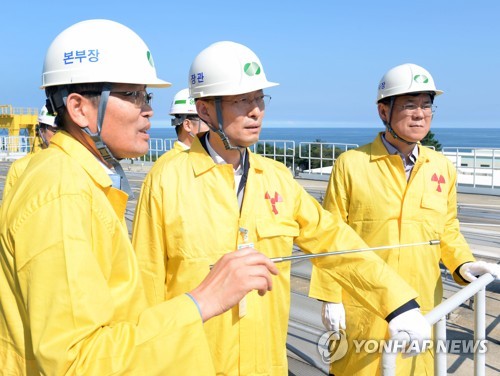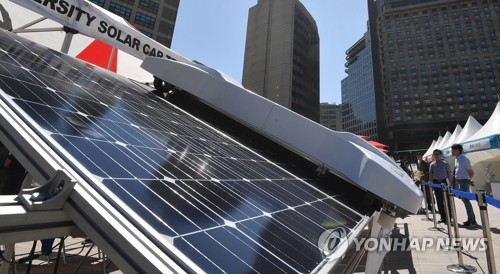South Korea's energy sector is on the verge of a major transformation, as the government pushes to gradually phase out nuclear power in favor of renewable energy, but policymakers and experts say strong public support and a feasible supply plan are needed to achieve the ambitious goal.
President Moon Jae-in has pledged to slowly end nuclear power and replace it with renewable energy. He has already suspended construction of two reactors and vowed to shut down those that reach the end of their operational life cycles.
The government's vision for "a nuclear-free era" is a drastic shift from past administrations, which favored nuclear power as a clean energy source and supported it as a growth driver in the export market.
South Korea operates 24 reactors, which generate about 30 percent of its electricity. With four new plants nearly completed, a plan to build four more has been abandoned and construction of two further reactors has been temporarily halted while the government holds public consultations that are due to finish next month.
While surveys are currently under way on whether to continue with construction of the two reactors, Seoul officials are working on an energy road map that includes plans to increase the ratio of renewable energy to 20 percent by 2030.
Paik Un-gyu, the head of the Ministry of Trade, Industry and Energy, said the long-term energy plan should consider the social and environmental benefits, rather than focusing on short-term economic advantages.
"Nuclear power is not a cheap energy source when taking into consideration its social and environmental costs. If more eco-friendly, cheaper energy sources are developed, that's the way the government should go," Paik said, during his visit to the country's second-oldest reactor, Wolsong No. 1 reactor, on the southeast coast, earlier this week.

The minister described the anti-nuclear policy as keeping pace with the global trend toward renewable energy and called for reviving discussions on the delayed construction of nuclear waste management facilities.
"A growing number of nations have ended the use of nuclear reactors and are shelving plans to build new facilities," Paik said. "Following Japan's Fukushima nuclear disaster in 2011, countries like Germany and France have actually reduced their reliance on nuclear energy by expanding investment in the renewable energy sector."
The dramatic about-face on energy policy highlights a struggle between the public, which is increasingly opposed to nuclear power, and an energy industry that wants a continued role for nuclear.
Yoon Won-seok, a labor union official at Korea Hydro & Nuclear Power (KHNP), expressed regret over the government's criticism of nuclear power, which has played a major role in the nation's industrial development.
"It is regrettable that the government is describing nuclear power as the axis of evil," Yoon said. "Although we do not oppose the government's push for renewable energy, it has to go in parallel with nuclear power to meet the rising electricity demand."
Industry officials also urged the government not to give up the technology and know-how to build commercial reactors, an area Moon's predecessors promoted as a promising export. In 2009, South Korea won its first nuclear contract in the United Arab Emirates and secured a contract to supply a research reactor for Jordan.
They say the anti-nuclear policy could weaken South Korea's presence in the global industry, which needs broad support in order to win big overseas projects.
"South Korea now possesses the world's top nuclear technology, following 50 years of development. The government has to come up with measures to help export it overseas in order to benefit the national economy," Yoon stressed.
The latest move also sparked concerns that the loss of electricity generation from nuclear plants could affect the energy supply and lead to hikes in electricity costs.
"South Korea is more than 95 percent reliant on outside sources to meet its energy needs, since it has few natural resources of its own, and that makes nuclear energy a feasible alternative," said Im Chae-young, a senior researcher at the Korea Atomic Energy Research Institute. "The next generation industrial revolution will also increase energy demands, a fact that needs to be considered when drawing up energy plans."

Although renewable sources like solar and wind have grown in popularity in recent years, experts say the local infrastructure and research levels are still in their early stages, partly due to heavy investment in traditional power plants.
They say the government should greatly expand investment in infrastructure for eco-friendly energy and ease regulations on new facilities, while calling for consistent policy implementation of its long-term goal.
"There are many limitations on selecting sites for building new solar plants," said Ahn Nam-sung, a professor at Hanyang University. "The investment in research and development should come with eased regulations from provincial governments." (Yonhap)

